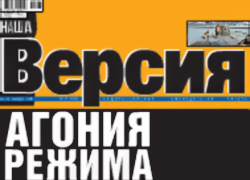Russian mass media: Change of power in Belarus inevitable
41- 23.08.2010, 14:24

In the run-up to the presidential campaign, the informational pressure from Russia on Lukashenka is to grow.
As written by a Russian newspaper “Nasha versiya”, the relations between Minsk and Moscow were deteriorating gradually during the last few years. The “friendship” of the allied states began to show signs of strain after Russian authorities became tired of listening to contradictory statements of their Belarusian colleagues and decided to transfer the dialogue into a concrete sphere and receive material gain from cooperation. This summer the conflict’s climax took place: for the first time the Kremlin expressed a desire to oust the current leader of Belarus, Alyaksandr Lukashenka. Have the point of no-return been passed in the bilateral relations? Will Lukashenka be able to stay in his position?
In July a serious row in the informational space started between Moscow and Minsk. NTV channel screened a documentary “Godbatka”, in which Alyaksandr Lukashenka was charged with establishing a dictatorship and neutralization of undesirable politicians. After the first film, a second episode followed, and just a week ago “Godbatka-3” was demonstrated. In the last episode of the film the leader of the union state was diagnosed with mosaic psychosis.
Belarusian propagandists responded with a swarm anti-Russian attack at the minds of their fellow citizens. The air time was offered to Georgian president Mikheil Saakashvili, who certainly is unlikely to say lots of good about Russia. The official gazette of the Council of Ministers of Belarus has published a critical report by Boris Nemtsov “Putin. Results. 10 years” with comments of local political writers. The key tone of news programs has changed greatly. Only negative things are said about Russia now: wildfires, corruption, crime and so on – contrasting it with a wonderful life in Belarus. Russian TV channels undergo censorship, for the positive image of the native land not to be damaged.
The smear war started not only at the level of mass media, but at the level of leaders of the two countries. Dmitry Medvedev has found out Lukashenka in a lie, stating that behind the closed doors in presence of other presidents he had promised to recognize independence of Abkhazia and South Ossetia, but failed to do so. Giving an answer to this reproach, Lukashenka charged the Russian colleague with “unconscientiousness” and “juggling with certain things dishonestly”. Russian president's aide Sergei Prikhodko offered to publish transcript from the Collective Security Treaty Organization (CSTO) session with statements of Alyaksandr Lukashenka for him not to be able to wriggle out of his promises, and to make public other statements of Lukashenka which would be rather interesting both to the Belarusian and international public, Prikhodko said.
It looks as if this time it would be impossible to neutralize the conflict between the leadership of Russia and Belarus quickly. “Informational pressure from Russia on Lukashenka is to grow in the run-up to the presidential campaign,” believes a Belarusian political analyst Yury Baranchyk. On September 7 the Belarusian “parliament” is to gather for an extraordinary session to rubberstamp the date of the presidential elections.
A full-fledged informational war, as observers think, shows that the Kremlin has got tired of dealing with an unpredictable leader of the neighbouring state. “By showing these series at Russian channels, swordplay at the highest level, demonstrate that Russia’s relations with Lukashenka have pushed to the limit. Many people in Russia are sick and tired of his behavior, his comments, his actions, which contradict the Kremlin’s concept of allied relations,” said First Deputy Chairman of the Committee of the State Duma for the CIS Affairs and relations with Russian nationals abroad Konstantin Zatulin.
In recent years legitimacy of Alyaksandr Lukashenka’s power was in large measure guaranteed by approval of Moscow and the CIS partners. Western countries refuse to recognize the Belarusian leader and view his as a usurper. Without a financial support of Russia “the Belarusian economic wonder” which provided support of Lukashenka’s policy inside the country, falls apart at the seams.
After Russia would be lost as an alley, change of power in Belarus looks inevitable. As a political analyst Yury Baranchyk is convinced, the relations of Moscow and the today’s Belarusian leader are past the point of no-return. “Under no circumstances Moscow would recognize Lukashenka’s victory in the elections legitimate, if he runs and secure “an elegant victory” as before,” he believes. Besides, there are reports that positions of Moscow and Brussels coincide, which is an infrequent occurrence. It means that Lukashenka risks to be left without any considerably support in the world. And the room for manoeuvre is dwindling rapidly. Lukashenka is most likely to “win” the election, but he would not be able to stay on top. As the political analyst supposes, after re-election Lukashenka would switch to openly Russophobe positions, and would tighten the screws inside the country. “An attempt to maintain power by methods of force has nothing to do with winning this situation, as it has been lost already. A loss, primarily a conceptual one, has taken place already,” Baranchyk said.
A note:
A weekly “Sovershenno sekretno – Versiya” was founded in 1998 by a well-known Russian journalist Artyom Borovik. The journalistic team of the newspaper became famous for a number of high-profile investigations, sensational materials. In 2005 the newspaper received a new name, “Nasha versiya”.










